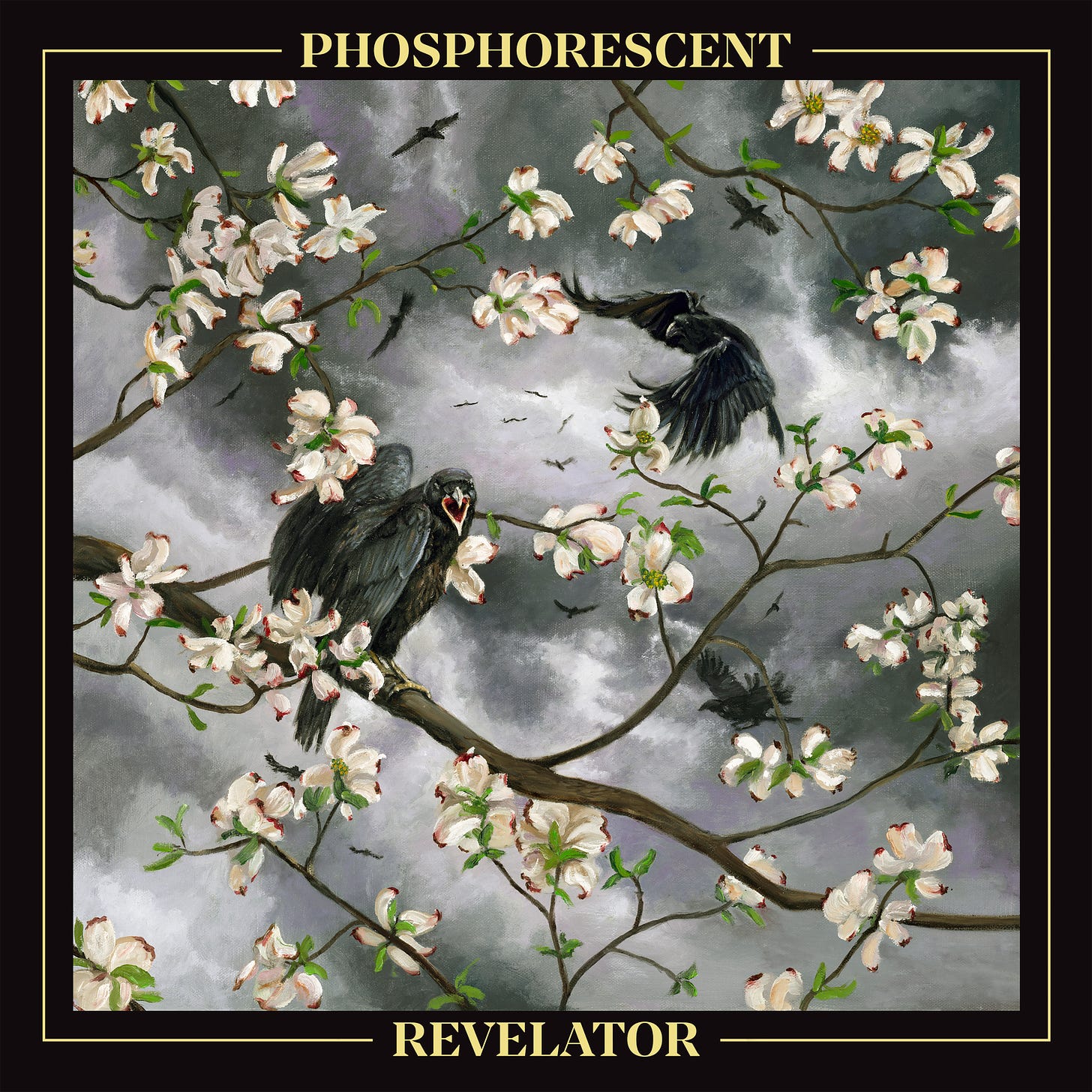At3 — Phosphorescent Blues
NASHVILLE | With "Revelator", Matthew Houck charts a new path forward for Phosphorescent
WORDS BY MICHAEL ZARATHUS-COOK
ILLUSTRATION BY DANE THIBEAULT
PHOTOGRAPHY BY CURTIS WAYNE MILLARD
“If you don’t know him, try. If you don’t like him, that’s ok too.”
—Michael Smith (No Wrong Notes) on Phosphorescent
In his latest studio recording, titled Revelator, we find Matthew Houck of Phosphorescent in the middle of a scene that’s unprecedented in the entirety of his discography:
I stand in the yard and watch the evening come down
And I shuffle the cards when all the idiots come around
These two lines are found halfway through the title song of Revelator, and describe a pointedly domestic scenery. It’s the kind you might not bat an eye at driving through any one of Nashville’s homely neighbourhoods, where Houck now lives with his family. For an artist whose lyrical universe has invented such fantastical imagery as “quotidian beasts,” wolves that “blaze with light,” mermaid parades, terrors in canyons, bones made of steam, cauterised veins and so on─simply standing flat-footed in a yard, waiting for sunset, is a new frontier of sorts for the Phosphorescent project.
Ask Houck and he’d tell you that “Revelator”, which opens the album, is probably the best song he’s ever written. Long-time listeners of Phosphorescent might bristle at the thought that anything new could top the sprawling list of songs that feature Houck singing with this spleen in that jaded and frayed tenor he’s perfected over the last twenty years. First-time listeners might hear in Revelator a hint of the “sad dad rock” that’s become the fashionable detour for once-raging troubadours now climbing gently into their forties. But it appears this album wants you to take a closer look at its seemingly benign sketches of daily life, and find in them intimations of the same night terrors that Houck has been chasing away ─ and chasing — since 2003’s A Hundred Times or More. Revelator swaps the unsettling critters of Phosphorescent’s distant past for something just as terrifying: daily life.
In Muchacho (2013), Houck sits across one of his quotidian beasts as she lays the beak of a raven on the table “just for show”, and her “ancient eyes” laid upon him. In Revelator, there are no frightening beasts in sight — save for the menacing birds on the album cover — instead he finds himself at a table with the village idiots, and a deck of cards to pass the time. It’s a whole new kind of terror.
Perhaps I’m listening too closely. Afterall, Houck begins the album with a confession in plain English:
I got tired of sadness
I got tired of all the madness
I got tired of being a badass all the time
Despite these opening declarations, Houck admits in my interview with him (below) that Revelator is in fact a very sad album. It’s sadness, however, is in the details etched into the contours of a relatively upbeat soundscape decorated with linear drum tracks, the mediterranean climate of its high strings, and short sweet sentences whispered on guitar. These colourful decors are only decoys for the blue hue that saturates the album’s gloomy timbres, as well as the colour palette of the music video for “Revelator”. Running parallel to the album’s lyrical simplicity — a simplicity hard won over two decades of seemingly impenetrable wordsmithing — Houck’s voice is as full and bold as it’s ever sounded. When his voice rests low, on songs like “Impossible House” and “All the Same”, it’s a sharp contrast to the vocal strains of early Phosphorescent, albeit a close sibling of 2018’s C’est La Vie. When he pushes up towards a higher register, on songs like “To Get it Right” and “A Moon Behind the Clouds”, an almost audible nod to Pride (2007) and Aw Come Aw Wry (2005) can be heard.
Be it in high strings or in the low swell of choral voices that is unmistakably Phosphorescent, Revelator is an album that is trying to touch grass. Moving from the lofty usages of the word “hej” (in Muchacho, and in 2010’s Here’s To Taking It Easy), to its more layman iteration of “hey” in Revelator is one subtle but notable indication of this album’s terrestrial longings. It’s this longing for firm ground, and the ambiguous lighting of a rising dawn — or perhaps the closing of a long evening — that gives the video for “Revelator” an eerie but hopeful blue tinge:
I’m almost jealous of those who are discovering Phosphorescent for the first time with Revelator. Their fresh eyes are better able to see the light of dawn in the sombre colouring of this latest addition to the Phosphorescent arc. More seasoned listeners might instead see in Revelator a final gesture to that thin and dimly-lit place that the project has lived since inception, as Houck goes around the bend to find new things to say and new ways to say it. Either way, this album seems to stand alone as a testament both to a sense of recovery, and to the daily reconciliations with what’s been lost.
Sibylle Baier ─ a German folk artist active in the 50s and 60s and whose music was likewise forged in the same “thin place” that Houck has been drawing from ─ has given exactly one interview in the last 50 years. The interviewer asked her what she remembers of the frail threads of being that inspired the songs on her album Colour Green, and she admits she couldn’t remember because, “life has been full since then.” For her, it was full mostly of family life, the daily business of tending to loved ones, gardens, card games and so on. While that process of fullness for Baier has happened away from the public eye, it’s a special thing to witness it in real-time through an artist’s output. That witness, I believe, is the undercurrent of Revelator’s place in Phosphorescent’s discography. With C’est La Vie, Houck wrote his first love song in “My Beautiful Boy”, a song about his son; now he rings in another Phosphorescent first on Revelator with the recording of a song written by someone else—his wife. Yet, every song on this album seems to volley the same gloomy question: What happens when you have a seemingly perfect life, and the darkness still lingers?
THE DETAILS
Release Date: April 5, 2024
Stream/Download Link: Here
Label: Verve Records
Key Collaborators: Jack Lawrence, Jim White, Jo Schornikow
Artist Website: Phosphorescent
Tracks:
01 Revelator
02 The World Is Ending
03 Fences
04 Impossible House
05 Wide as Heaven
06 A Moon Behind the Clouds
07 All the Same
08 A Poem on the Men’s Room Wall
09 To Get It Right










